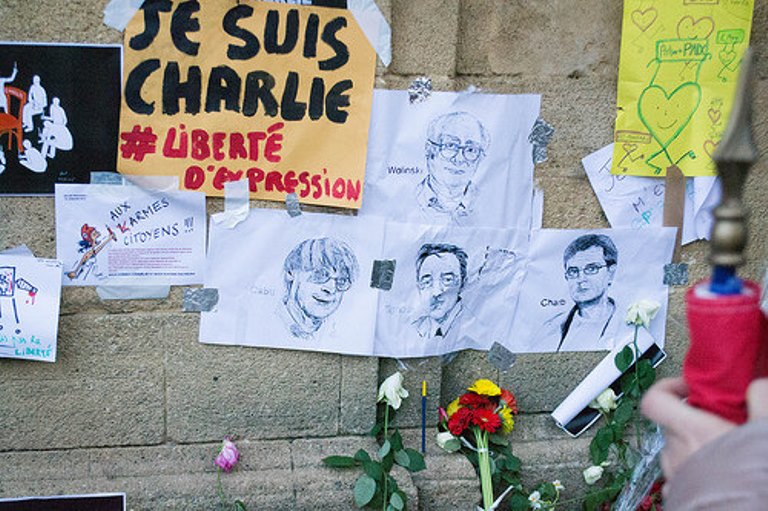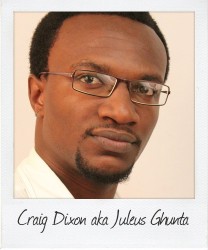"Charlie Hebdo affair: not about freedom of speech"
February 4Reaction to the Charlie Hebdo shootings has been strong, but Craig Dixon, aka Juleus Ghunta, 27, a Commonwealth Correspondent from Jamaica, argues for a closer look at freedom of speech and the role of politics.
The Charlie Hebdo shooting in France has been, quite rightly, widely condemned. Some Jihadist groups, however, including the Islamic State (IS) and Al-Qaeda in the Arabian Peninsula (AQAP) have celebrated it as an inevitable backlash, in a broad sense, to the West’s violence and neo-colonialist exploits in the East, and in particular to Charlie Hebdo’s alleged racism and Islamophobia.
In what has become a global stand in solidarity, the hashtag #JeSuisCharlie (I am Charlie) has been flashed across millions of screens. Equally visible are the views of a growing number of contrarians who have lashed back with hashtags of their own: #JeNeSuisPasCharlie (IamNOTCharlie) and #JesuisAhmed. Ahmed Merabet was the French Muslim police officer murdered by the shooters while guarding Charlie Hebdo staff. Ahmed, like most Muslims, was not a violent extremist. Invoking the spirit of Voltaire, sympathisers claim that Mr. Merabet died in defense of Charlie Hebdo’s right to “attack and insult” what was sacred to him.
The line between satire, racism and sacrilege can be a thin one. The magazine’s caricature of Christiane Taubira, France’s black Minister of Justice has been largely misunderstood. Depicted as a monkey, the caricature (poorly) satirised the racist remarks of Front National’s (FN) former candidate Anne-Sophie Leclere. Ms. Leclere compared the Minister to a monkey on national television and was slapped with a nine month prison sentence and a £39,500 fine. This image has been referenced prominently by #JesuisCharlie detractors, including notable Muslim writer Mehdi Hasan. Let’s take Charlie Hebdo’s word on this one.
But what of the magazine’s depiction of Muslims? Critics contend that Charlie Hebdo is decidedly anti-Islamic. One such critic is Olivier Cyran, a former employee in the 1990s. Responding to a piece on Charlie Hebdo’s ‘anti-racist stance’, written by former editor ‘Charb’ and published in Le Monde, Mr. Cyran (Article 11, 2013) noted “the distressing transformation” of the magazine following the events of September 11, 2001:
“Islamophobic neurosis…bit by bit took over your pages from that day”, he wrote.
In the past week many writers have elevated satire to a deific status, and satirists as humanity’s wardens of truth and free will. I agree with blogger Scott Long (A Paper Bird) that “Satire can sometimes liberate us”, but that doesn’t make it “…immune from our prejudices or untainted by our hatreds…The superiority the satirist claims over the helpless can be both smug and sinister.”
Oliver Cyran contends that Charlie Hebdo has promoted and sponsored racial, religious and political humiliation and marginalisation of a minority in France. Charlie Hebdo is not content, he believes, with merely satirising socio-religious dissimilarities – the magazine is keen on widening them.
These are highly contentious issues in France. In May, 2014, The Guardian reported the resignation of Mr. Zaïr Kédadouche, a former French ambassador to Andorra. Mr. Kédadouche, who is of Algerian descent, later sued the foreign ministry, accusing the French government of institutional “racism and classism”.
There is ‘freer speech’ in the West compared to Arab states, but there are obvious thresholds that civilians cannot ‘properly’ access. This is clear from the jailing and exile of American whistle blowers such as Chelsea Manning and Edward Snowden. In 2003, a U.S aircraft bombed an Al Jazeera TV station in Baghdad, killing one journalist and wounding others. The journalists were accused of ‘endangering American troops’. Holocaust denial is punishable by imprisonment in many countries in Europe, including France. French comedian Dieudonne M’bala M’bala, who according to the BBC, “likened himself to (supermarket) gunman Amedy Coulibaly”, was recently arrested for “defending terrorism”. Free speech is not at all free.
It seems too that freedom of speech is a secondary issue in this matter. In his article, ‘The pen vs. the gun’, Philip Gourevitch of The New Yorker referred to militant Islamists as “…the deadly foes of our civilization.” Other journalists from The New Yorker and in media such as Al Jazeera and The New York Times have exposed the clear hypocrisy in such statements.
This hypocrisy is no more evident than in the number of ‘undemocratic’ world leaders who participated in what many have called a ‘freedom of speech photo-op’ in Paris recently. Reporters Without Borders stated that they were “…appalled by the presence of leaders from countries where journalists and bloggers are systematically persecuted, such as Egypt, Russia, Turkey and United Arab Emirates.”
To many of the #JeSuisCharlie advocates, the terrorists’ actions have further legitimised the West and her allies’ interference in Arab states. But even as we justly condemn the violence of the shooters and movements like Boko Haram, let’s be truthful about the role of the West in the world’s unending paroxysms of murderous rage. Consider, for example, the fact that the Charlie Hebdo shooters were radicalised during America’s invasion of Iraq. It’s undeniable, from whichever angle we take it, that ‘France’s worst terrorist attack in fifty years’, cannot compare to the countless deaths the West have inflicted in the East or the scores that U.S. drone strikes will kill in Pakistan in coming months. In our discussions on radical Islam, let’s not downplay the crimes of the radical West.
photo credit: Visages et messages via photopin (license)
………………………………………………………………………………………………………
About me: I am a youth motivational speaker, dreamrighter and poet, and the creator of the D.R.E.A.M.R.I.G.H.T concept. I have delivered moving presentations at numerous organisations in Jamaica, across the Caribbean and in Africa. In 2013 Ireceived the Prime Minister’s National Youth Award for Excellence as a youth advocate. My poems have appeared or are forthcoming in Bim: Arts for the 21st Century (Barbados), Bookends (Sunday Observer) and Poetry Pacific (Canada). Email feedback to juleusghunta@gmail.com
………………………………………………………………………………………………………
Opinions expressed in this article are those of the author and do not necessarily represent the views of the Commonwealth Youth Programme. Articles are published in a spirit of dialogue, respect and understanding. If you disagree, why not submit a response?
To learn more about becoming a Commonwealth Correspondent please visit: http://www.yourcommonwealth.org/submit-articles/commonwealthcorrespondents/
…………………………………………………………………………………………………





